GFP Antibody - BSA Free Best Seller
Novus Biologicals, part of Bio-Techne | Catalog # NB100-1770

Key Product Details
Species Reactivity
Validated:
Non-species specific
Cited:
Human, Mouse, Non-species specific, Rabbit
Applications
Validated:
Electron Microscopy, ELISA, Flow Cytometry, Immunocytochemistry/ Immunofluorescence, Immunohistochemistry, Immunohistochemistry Free-Floating, Immunohistochemistry-Frozen, Immunohistochemistry-Paraffin, Immunoprecipitation, Knockdown Validated, Knockout Validated, Proximity Ligation Assay, Western Blot
Cited:
Block/Neutralize, Electron Microscopy, ELISA, Flow Cytometry, IF/IHC, Immunocytochemistry/ Immunofluorescence, Immunofluorescence, Immunohistochemistry, Immunohistochemistry Free-Floating, Immunohistochemistry-Frozen, Immunohistochemistry-Paraffin, In vivo assay, Knockdown Validated, Knockout Validated, Proximity Ligation Assay, Western Blot
Label
Unconjugated
Antibody Source
Polyclonal Goat IgG
Format
BSA Free
Concentration
Please see the vial label for concentration. If unlisted please contact technical services.
Product Specifications
Immunogen
The immunogen is a Green Fluorescent Protein (GFP) fusion protein corresponding to the full length amino acid sequence (246aa) derived from the jellyfish Aequorea victoria. (Uniprot: P42212)
Reactivity Notes
No reaction was observed against Human, or Rat serum proteins. Known Cross Reactivity: rGFP. YFP differs from GFP due to a mutation at Thr203Tyr; antibodies raised against full-length GFP should also detect YFP and other variants. Reactivity in transgenic mice with GFP. Reactivity in human cell lines transfected will a GFP construct.
Specificity
No reaction was observed against Human, Mouse or Rat serum proteins.
Clonality
Polyclonal
Host
Goat
Isotype
IgG
Description
GFP antibody was prepared from monospecific antiserum by immunoaffinity chromatography using Green Fluorescent Protein (Aequorea victoria) coupled to agarose beads followed by solid phase adsorption(s) to remove any unwanted reactivities. Assay by immunoelectrophoresis resulted in a single precipitin arc against anti-Goat Serum and purified and partially purified Green Fluorescent Protein (Aequorea victoria)
Store this antibody at -20C prior to opening. Aliquot contents and freeze at -20C or below for extended storage. Avoid cycles of freezing and thawing. Centrifuge product if not completely clear after standing at room temperature. This product is stable for several weeks at 4C as an undiluted liquid. Dilute only prior to immediate use.
Store this antibody at -20C prior to opening. Aliquot contents and freeze at -20C or below for extended storage. Avoid cycles of freezing and thawing. Centrifuge product if not completely clear after standing at room temperature. This product is stable for several weeks at 4C as an undiluted liquid. Dilute only prior to immediate use.
Scientific Data Images for GFP Antibody - BSA Free
Immunofluorescent Staining of Mouse Pancreas Using Biotin Conjugated GFP Antibody
Analysis using the Biotin conjugate of NB100-1770. Staining of transgenic mouse pancreas, expressing GFP in beta cells. Image courtesy of product review by Dr. Yves Heremans of Vrije Universiteit Brussel.Immunohistochemical Staining of Drosophila Central Nervous System Tissue Using Biotin Conjugated GFP Antibody
Analysis of Biotin conjugate of NB100-1770. Tissue: Drosophila melanogaster late stage embryonic central nervous system. Fixation: 0.5% PFA. Antigen retrieval: not required. Primary antibody: Anti-GFP antibody at a 1:1000 for 1 h at RT.Western Blot Detection of GFP Using FITC Conjugated Antibody
Analysis using the FITC conjugate of NB100-1770. Lane 1: GFP (50 ug). Primary antibody: None. Secondary antibody: Fluorescein goat secondary antibody at 1:1000 for 60 min at RT. Block for 30 minutes.Applications for GFP Antibody - BSA Free
Application
Recommended Usage
ELISA
1:10000-1:30000
Electron Microscopy
1:10 - 1:500
Flow Cytometry
1:10 - 1:1000
Immunocytochemistry/ Immunofluorescence
1:500
Immunohistochemistry
1:200-1:1000
Immunohistochemistry Free-Floating
1:10 - 1:500
Immunohistochemistry-Frozen
1:10 - 1:500
Immunohistochemistry-Paraffin
1:10 - 1:500
Immunoprecipitation
1:10 - 1:500
Western Blot
1:1000-1:10000
Application Notes
This product is designed to detect GFP and its variants. Goat This product has been tested by ELISA, SDS-PAGE, Western blot, and Immunofluorescence. This product is ideal for western blotting, ELISA, immunofluorescence, IHC, and IP. This antibody can be used to detect GFP by ELISA (sandwich or capture) for the direct binding of antigen and recognizes wild type, recombinant and enhanced forms of GFP. Biotin conjugated polyclonal anti-GFP used in a sandwich ELISA is well suited to titrate GFP in solution using this antibody in combination with monoclonal anti-GFP using either form of the antibody as the capture or detection antibody. However, use the monoclonal form only for the detection of wild type or recombinant GFP as this form does not sufficiently detect 'enhanced' GFP. The detection antibody is typically conjugated to biotin and subsequently reacted with streptavidin-HRP. Fluorochrome conjugated polyclonal anti-GFP can be used to detect GFP by immunofluorescence microscopy in prokaryotic (E.coli) and eukaryotic (CHO cells) expression systems and detects GFP containing inserts. Significant amplification of signal is achieved using fluorochrome conjugated polyclonal anti-GFP relative to the fluorescence of GFP alone. For immunoblotting use either alkaline phosphatase or peroxidase conjugated polyclonal anti-GFP to detect GFP or GFP-containing proteins on western blots. Researchers should determine optimal titers for applications.
Reviewed Applications
Read 7 reviews rated 4.7 using NB100-1770 in the following applications:
Formulation, Preparation, and Storage
Purification
Immunogen affinity purified
Formulation
0.02 M Potassium Phosphate, 0.15 M Sodium Chloride, pH 7.2
Format
BSA Free
Preservative
0.01% Sodium Azide
Concentration
Please see the vial label for concentration. If unlisted please contact technical services.
Shipping
The product is shipped with polar packs. Upon receipt, store it immediately at the temperature recommended below.
Stability & Storage
Store at -20C. Avoid freeze-thaw cycles.
Background: GFP
References
1. Shi, C., Pan, F. C., Kim, J. N., Washington, M. K., Padmanabhan, C., Meyer, C. T., . . . Means, A. L. (2019). Differential Cell Susceptibilities to Kras(G12D) in the Setting of Obstructive Chronic Pancreatitis. Cell Mol Gastroenterol Hepatol. doi:10.1016/j.jcmgh.2019.07.001
2. Zhao, S., Fortier, T. M., & Baehrecke, E. H. (2018). Autophagy Promotes Tumor-like Stem Cell Niche Occupancy. Curr Biol, 28(19), 3056-3064.e3053. doi:10.1016/j.cub.2018.07.075
3. Zusso, M., Lunardi, V., Franceschini, D., Pagetta, A., Lo, R., Stifani, S., . . . Moro, S. (2019). Ciprofloxacin and levofloxacin attenuate microglia inflammatory response via TLR4/NF-kB pathway. J Neuroinflammation, 16(1), 148. doi:10.1186/s12974-019-1538-9
Long Name
Green Fluorescent Protein
Alternate Names
eGFP, GFPuv
Additional GFP Products
Product Documents for GFP Antibody - BSA Free
Product Specific Notices for GFP Antibody - BSA Free
This product is for research use only and is not approved for use in humans or in clinical diagnosis. Primary Antibodies are guaranteed for 1 year from date of receipt.
Loading...
Loading...
Loading...
Loading...
Loading...
Loading...
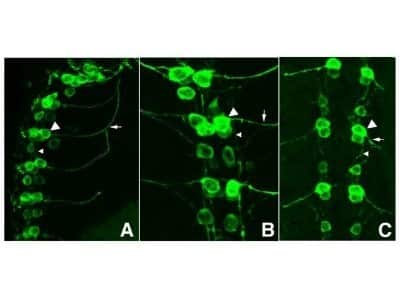
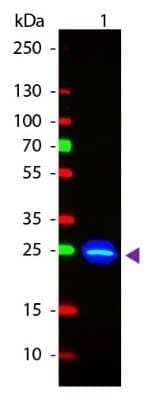

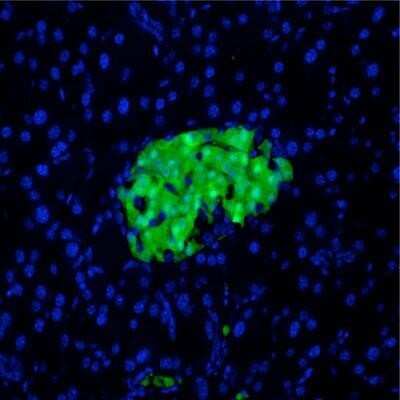
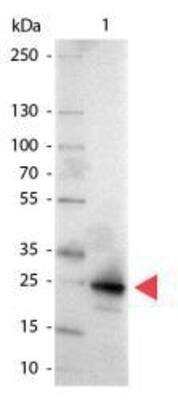
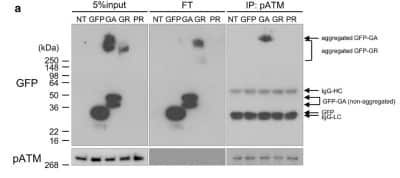
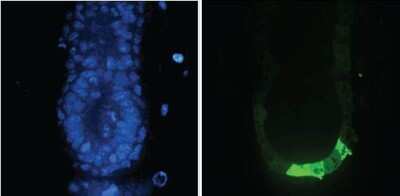
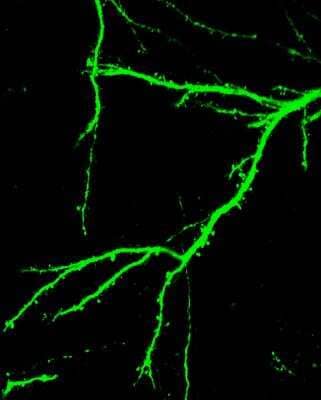

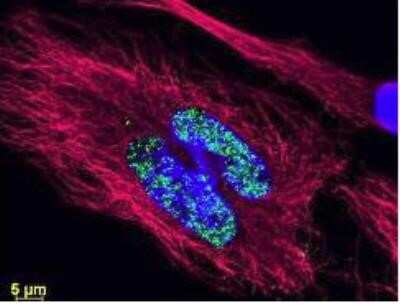
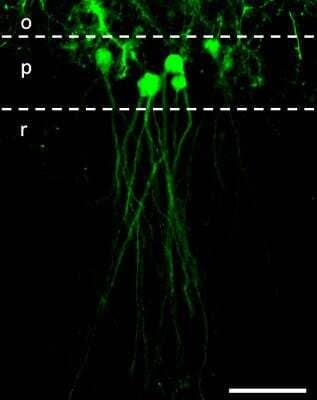
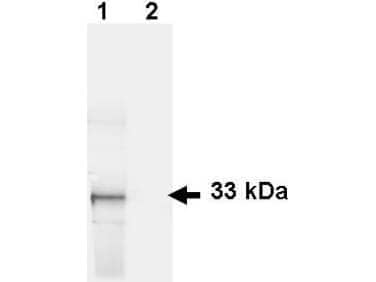
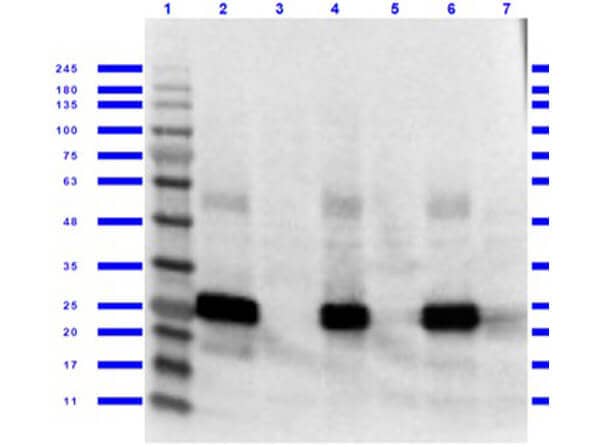
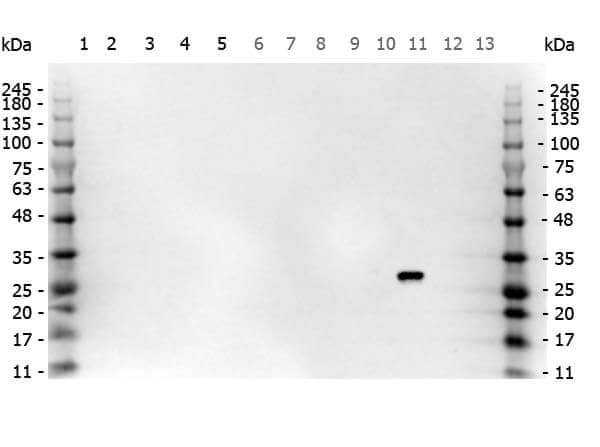
![Immunocytochemistry/ Immunofluorescence: GFP Antibody [NB100-1770] - GFP Antibody](https://resources.bio-techne.com/images/products/nb100-1770_goat-polyclonal-gfp-antibody-310202415525264.jpg)
![Immunohistochemistry: GFP Antibody [NB100-1770] - GFP Antibody](https://resources.bio-techne.com/images/products/nb100-1770_goat-polyclonal-gfp-antibody-31020241553380.jpg)
![Immunocytochemistry/ Immunofluorescence: GFP Antibody [NB100-1770] - GFP Antibody](https://resources.bio-techne.com/images/products/nb100-1770_goat-polyclonal-gfp-antibody-31020241682115.jpg)
![Immunocytochemistry/ Immunofluorescence: GFP Antibody [NB100-1770] - GFP Antibody](https://resources.bio-techne.com/images/products/nb100-1770_goat-polyclonal-gfp-antibody-31020241612616.jpg)
![Immunocytochemistry/ Immunofluorescence: GFP Antibody [NB100-1770] - GFP Antibody](https://resources.bio-techne.com/images/products/nb100-1770_goat-polyclonal-gfp-antibody-310202415525262.jpg)
![Immunocytochemistry/ Immunofluorescence: GFP Antibody [NB100-1770] - GFP Antibody](https://resources.bio-techne.com/images/products/nb100-1770_goat-polyclonal-gfp-antibody-310202415541948.jpg)